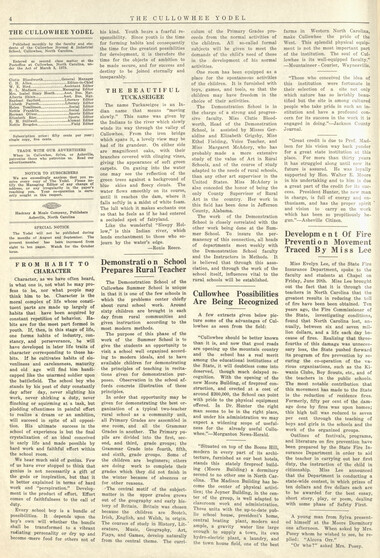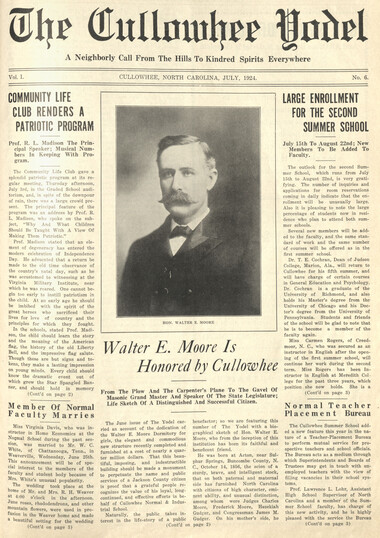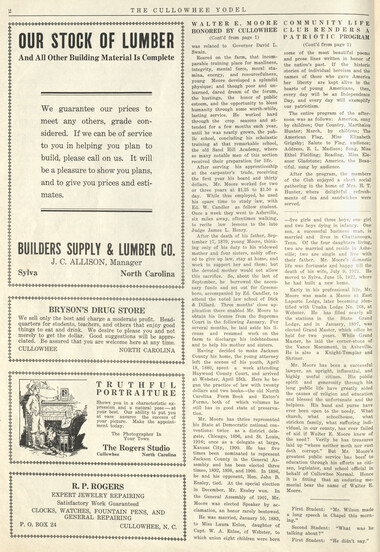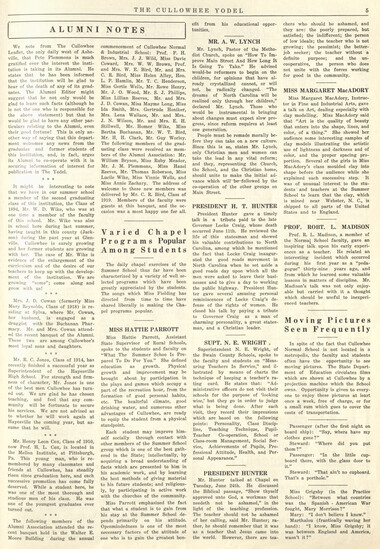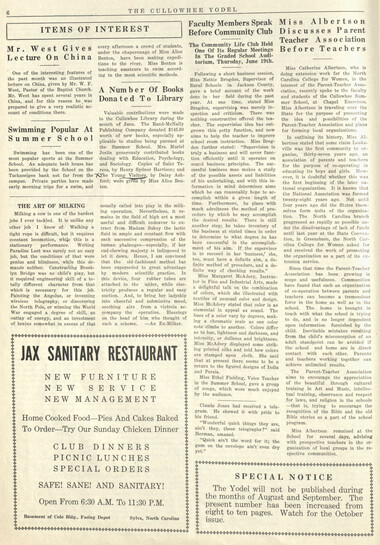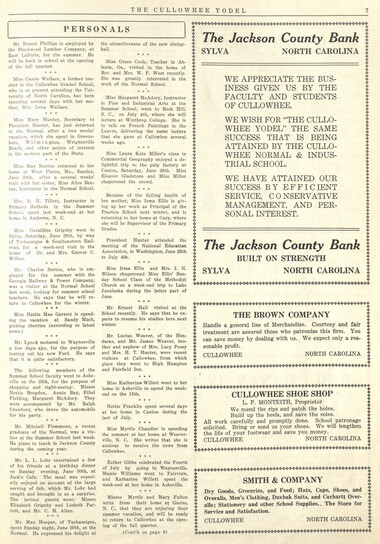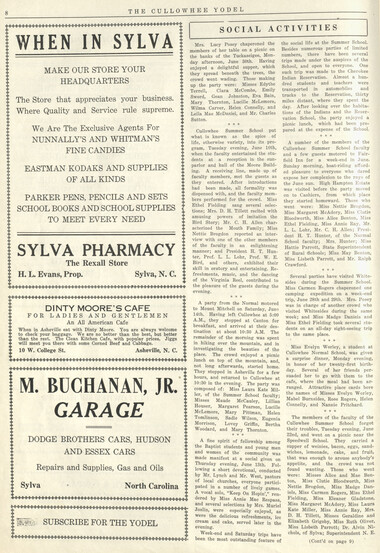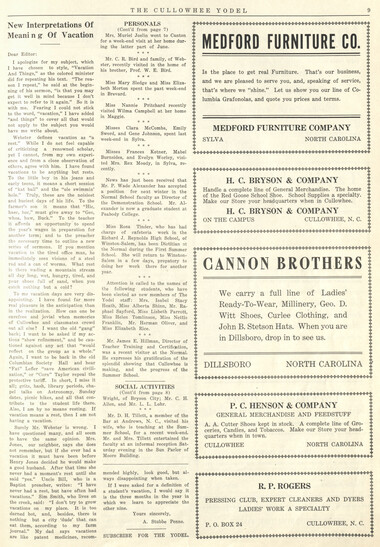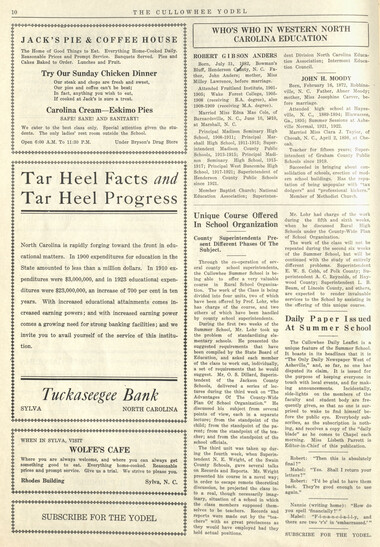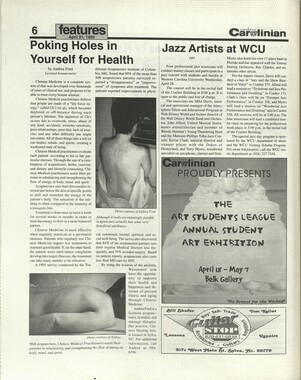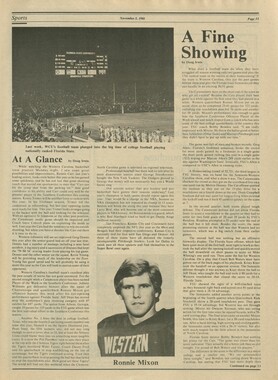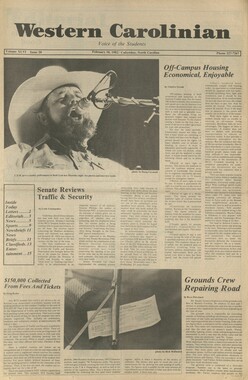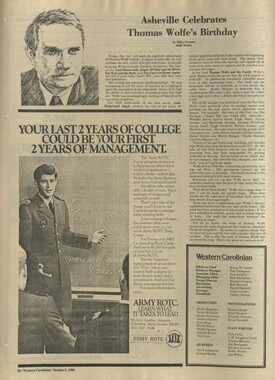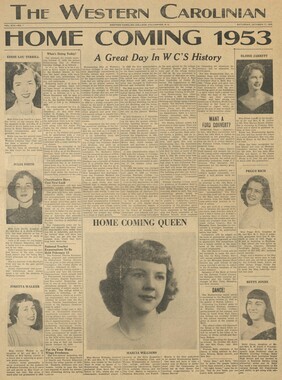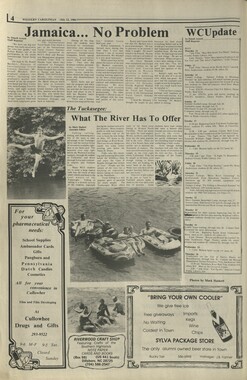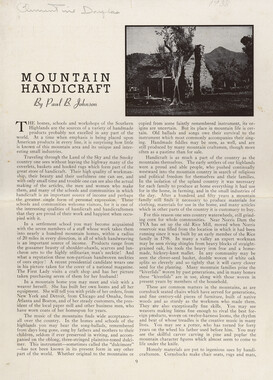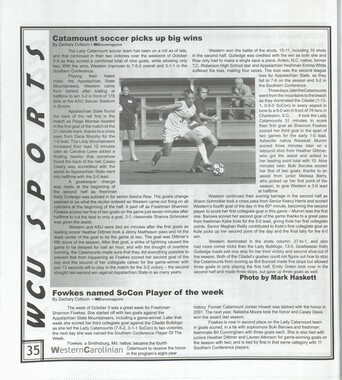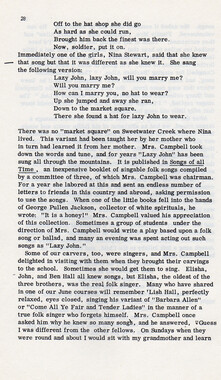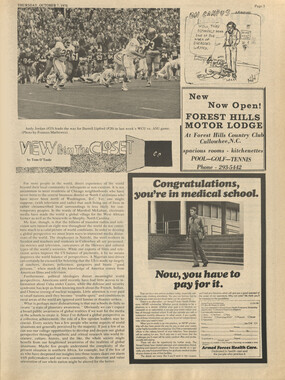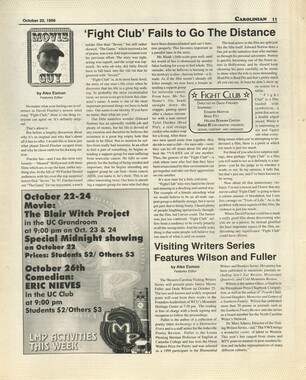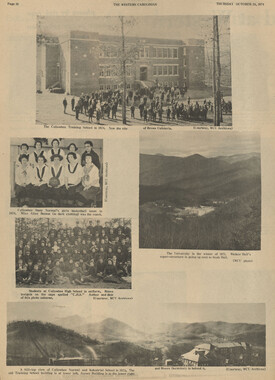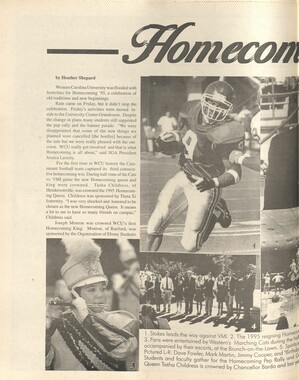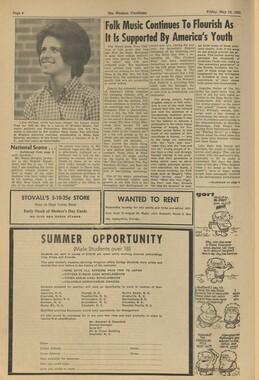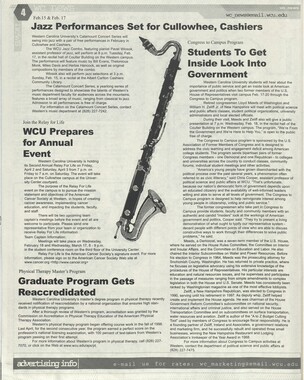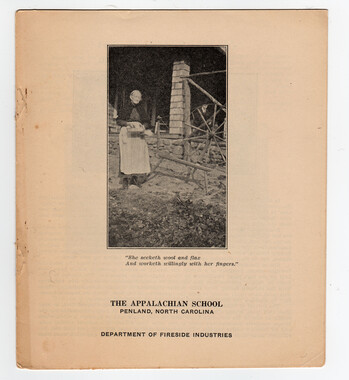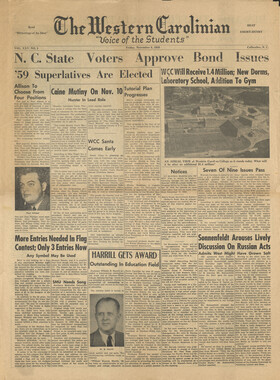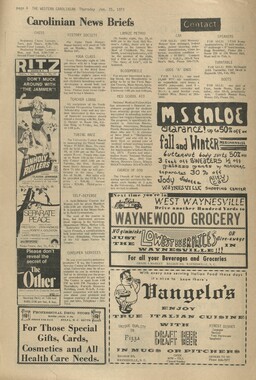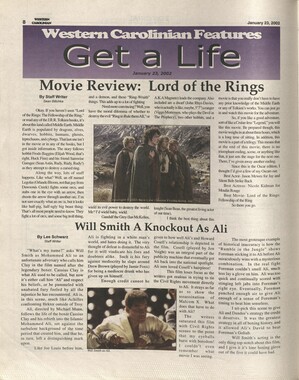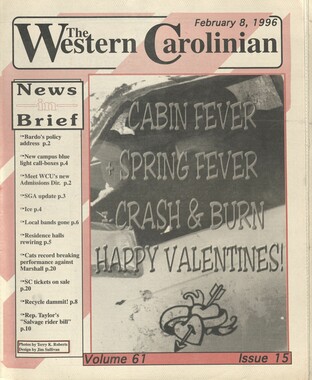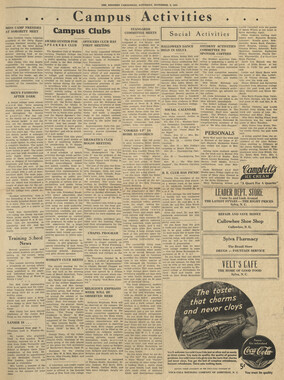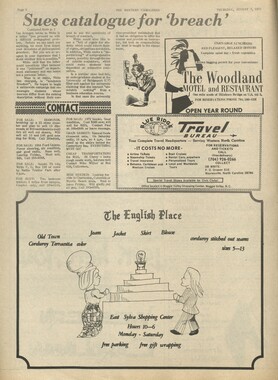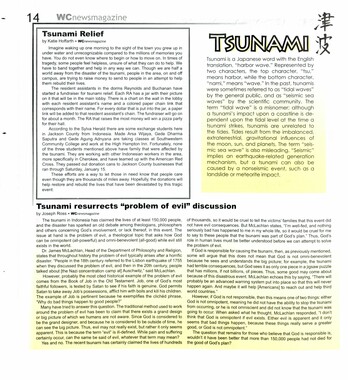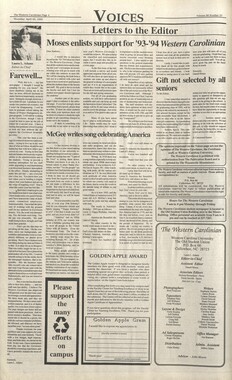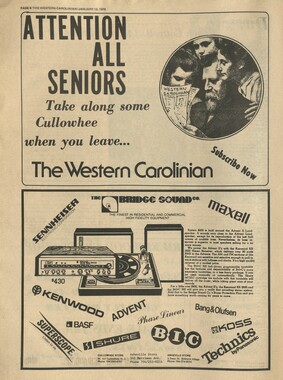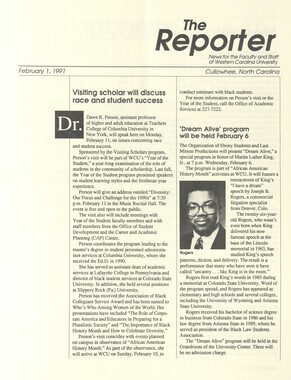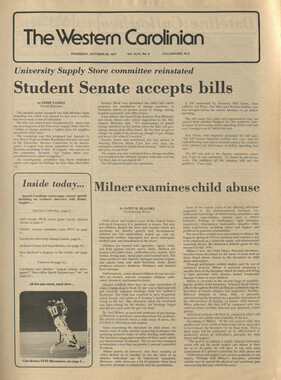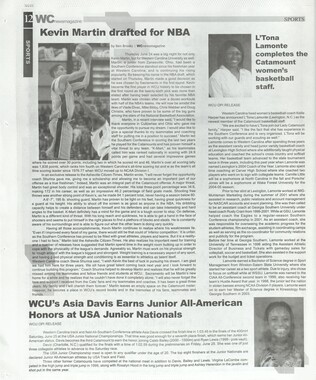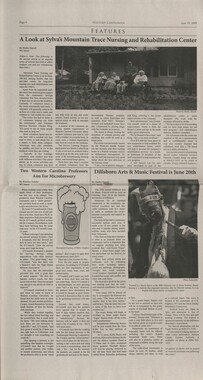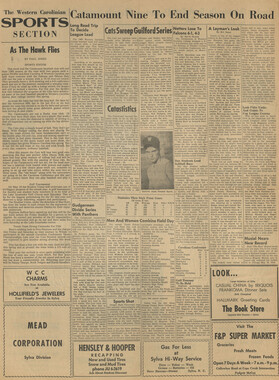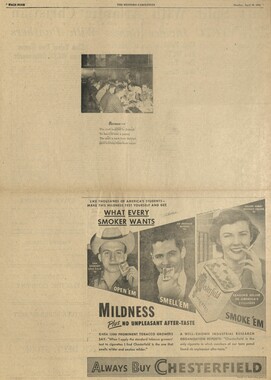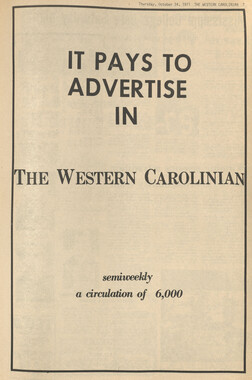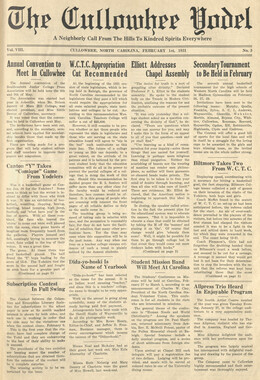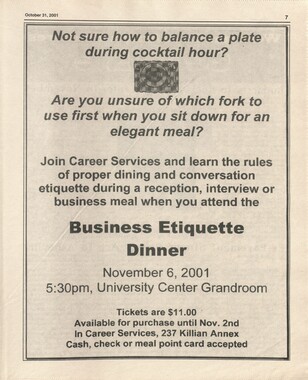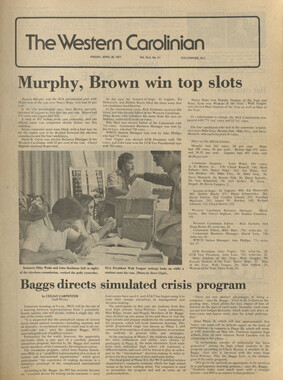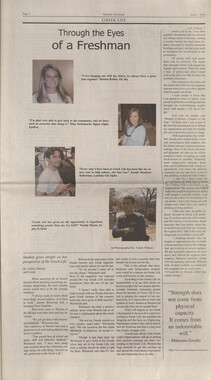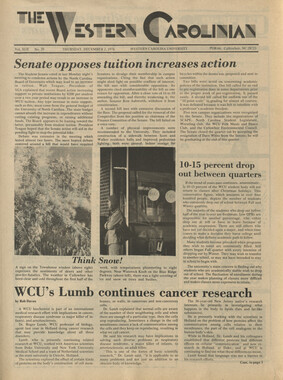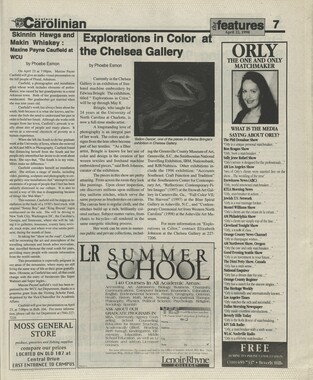Western Carolina University (21)
View all
- Canton Champion Fibre Company (2308)
- Cherokee Traditions (291)
- Civil War in Southern Appalachia (165)
- Craft Revival (1942)
- George Masa Collection (137)
- Great Smoky Mountains - A Park for America (3080)
- Highlights from Western Carolina University (422)
- Horace Kephart (973)
- Journeys Through Jackson (159)
- LGBTQIA+ Archive of Jackson County (89)
- Oral Histories of Western North Carolina (318)
- Picturing Appalachia (6617)
- Stories of Mountain Folk (413)
- Travel Western North Carolina (153)
- Western Carolina University Fine Art Museum Vitreograph Collection (129)
- Western Carolina University Herbarium (92)
- Western Carolina University: Making Memories (738)
- Western Carolina University Publications (2491)
- Western Carolina University Restricted Electronic Theses and Dissertations (146)
- Western North Carolina Regional Maps (71)
- World War II in Southern Appalachia (131)
University of North Carolina Asheville (6)
View all
- Allanstand Cottage Industries (62)
- Appalachian National Park Association (53)
- Bennett, Kelly, 1890-1974 (1463)
- Berry, Walter (76)
- Brasstown Carvers (40)
- Carver, George Washington, 1864?-1943 (26)
- Cathey, Joseph, 1803-1874 (1)
- Champion Fibre Company (233)
- Champion Paper and Fibre Company (297)
- Cherokee Indian Fair Association (16)
- Cherokee Language Program (22)
- Crowe, Amanda (40)
- Edmonston, Thomas Benton, 1842-1907 (7)
- Ensley, A. L. (Abraham Lincoln), 1865-1948 (275)
- Fromer, Irving Rhodes, 1913-1994 (70)
- George Butz (BFS 1907) (46)
- Goodrich, Frances Louisa (120)
- Grant, George Alexander, 1891-1964 (96)
- Heard, Marian Gladys (60)
- Kephart, Calvin, 1883-1969 (15)
- Kephart, Horace, 1862-1931 (313)
- Kephart, Laura, 1862-1954 (67)
- Laney, Gideon Thomas, 1889-1976 (439)
- Masa, George, 1881-1933 (61)
- McElhinney, William Julian, 1896-1953 (44)
- Niggli, Josephina, 1910-1983 (10)
- North Carolina Park Commission (105)
- Osborne, Kezia Stradley (9)
- Owens, Samuel Robert, 1918-1995 (11)
- Penland Weavers and Potters (36)
- Roberts, Vivienne (15)
- Roth, Albert, 1890-1974 (142)
- Schenck, Carl Alwin, 1868-1955 (1)
- Sherrill's Photography Studio (2565)
- Southern Highland Handicraft Guild (127)
- Southern Highlanders, Inc. (71)
- Stalcup, Jesse Bryson (46)
- Stearns, I. K. (213)
- Thompson, James Edward, 1880-1976 (226)
- United States. Indian Arts and Crafts Board (130)
- USFS (683)
- Vance, Zebulon Baird, 1830-1894 (1)
- Weaver, Zebulon, 1872-1948 (58)
- Western Carolina College (230)
- Western Carolina Teachers College (282)
- Western Carolina University (2008)
- Western Carolina University. Mountain Heritage Center (18)
- Whitman, Walt, 1819-1892 (10)
- Wilburn, Hiram Coleman, 1880-1967 (73)
- Williams, Isadora (3)
- Cain, Doreyl Ammons (0)
- Crittenden, Lorraine (0)
- Rhodes, Judy (0)
- Smith, Edward Clark (0)
- Appalachian Region, Southern (3032)
- Asheville (N.C.) (1945)
- Avery County (N.C.) (26)
- Blount County (Tenn.) (195)
- Buncombe County (N.C.) (1680)
- Cherokee County (N.C.) (283)
- Clay County (N.C.) (556)
- Graham County (N.C.) (238)
- Great Smoky Mountains National Park (N.C. and Tenn.) (535)
- Haywood County (N.C.) (3573)
- Henderson County (N.C.) (70)
- Jackson County (N.C.) (4925)
- Knox County (Tenn.) (35)
- Knoxville (Tenn.) (13)
- Lake Santeetlah (N.C.) (10)
- Macon County (N.C.) (421)
- Madison County (N.C.) (216)
- McDowell County (N.C.) (39)
- Mitchell County (N.C.) (135)
- Polk County (N.C.) (35)
- Qualla Boundary (982)
- Rutherford County (N.C.) (78)
- Swain County (N.C.) (2185)
- Transylvania County (N.C.) (270)
- Watauga County (N.C.) (12)
- Waynesville (N.C.) (86)
- Yancey County (N.C.) (72)
- Aerial Photographs (3)
- Aerial Views (60)
- Albums (books) (4)
- Articles (1)
- Artifacts (object Genre) (228)
- Bibliographies (1)
- Biography (general Genre) (2)
- Cards (information Artifacts) (38)
- Clippings (information Artifacts) (192)
- Copybooks (instructional Materials) (3)
- Crafts (art Genres) (622)
- Depictions (visual Works) (21)
- Design Drawings (1)
- Digital Moving Image Formats (2)
- Drawings (visual Works) (185)
- Envelopes (101)
- Exhibitions (events) (1)
- Facsimiles (reproductions) (1)
- Fiction (general Genre) (4)
- Financial Records (12)
- Fliers (printed Matter) (67)
- Glass Plate Negatives (381)
- Guidebooks (2)
- Internegatives (10)
- Interviews (823)
- Land Surveys (102)
- Letters (correspondence) (1045)
- Manuscripts (documents) (618)
- Maps (documents) (177)
- Memorandums (25)
- Minutes (administrative Records) (59)
- Negatives (photographs) (6090)
- Newsletters (1290)
- Newspapers (2)
- Notebooks (8)
- Occupation Currency (1)
- Paintings (visual Works) (1)
- Pen And Ink Drawings (1)
- Periodicals (194)
- Personal Narratives (10)
- Photographs (12977)
- Plans (maps) (1)
- Poetry (6)
- Portraits (4568)
- Postcards (329)
- Programs (documents) (181)
- Publications (documents) (2444)
- Questionnaires (65)
- Relief Prints (26)
- Sayings (literary Genre) (1)
- Scrapbooks (282)
- Sheet Music (2)
- Slides (photographs) (402)
- Songs (musical Compositions) (2)
- Sound Recordings (802)
- Specimens (92)
- Speeches (documents) (18)
- Tintypes (photographs) (8)
- Transcripts (329)
- Text Messages (0)
- A.L. Ensley Collection (275)
- Appalachian Industrial School Records (7)
- Appalachian National Park Association Records (336)
- Axley-Meroney Collection (2)
- Bayard Wootten Photograph Collection (20)
- Bethel Rural Community Organization Collection (7)
- Blumer Collection (5)
- C.W. Slagle Collection (20)
- Canton Area Historical Museum (2110)
- Carlos C. Campbell Collection (462)
- Cataloochee History Project (64)
- Cherokee Studies Collection (4)
- Daisy Dame Photograph Album (5)
- Daniel Boone VI Collection (1)
- Doris Ulmann Photograph Collection (112)
- Elizabeth H. Lasley Collection (1)
- Elizabeth Woolworth Szold Fleharty Collection (4)
- Frank Fry Collection (95)
- George Masa Collection (173)
- Gideon Laney Collection (452)
- Hazel Scarborough Collection (2)
- Hiram C. Wilburn Papers (28)
- Historic Photographs Collection (236)
- Horace Kephart Collection (861)
- Humbard Collection (33)
- Hunter and Weaver Families Collection (1)
- I. D. Blumenthal Collection (4)
- Isadora Williams Collection (4)
- Jesse Bryson Stalcup Collection (47)
- Jim Thompson Collection (224)
- John B. Battle Collection (7)
- John C. Campbell Folk School Records (80)
- John Parris Collection (6)
- Judaculla Rock project (2)
- Kelly Bennett Collection (1482)
- Love Family Papers (11)
- Major Wiley Parris Civil War Letters (3)
- Map Collection (12)
- McFee-Misemer Civil War Letters (34)
- Mountain Heritage Center Collection (4)
- Norburn - Robertson - Thomson Families Collection (44)
- Pauline Hood Collection (7)
- Pre-Guild Collection (2)
- Qualla Arts and Crafts Mutual Collection (12)
- R.A. Romanes Collection (681)
- Rosser H. Taylor Collection (1)
- Samuel Robert Owens Collection (94)
- Sara Madison Collection (144)
- Sherrill Studio Photo Collection (2558)
- Smoky Mountains Hiking Club Collection (616)
- Stories of Mountain Folk - Radio Programs (374)
- The Reporter, Western Carolina University (510)
- Venoy and Elizabeth Reed Collection (16)
- WCU Gender and Sexuality Oral History Project (36)
- WCU Mountain Heritage Center Oral Histories (25)
- WCU Oral History Collection - Mountain People, Mountain Lives (71)
- WCU Students Newspapers Collection (1923)
- Western North Carolina Tomorrow Black Oral History Project (69)
- William Williams Stringfield Collection (2)
- Zebulon Weaver Collection (109)
- African Americans (390)
- Appalachian Trail (35)
- Artisans (521)
- Cherokee art (84)
- Cherokee artists -- North Carolina (10)
- Cherokee language (21)
- Cherokee pottery (101)
- Cherokee women (208)
- Church buildings (190)
- Civilian Conservation Corps (U.S.) (111)
- College student newspapers and periodicals (2012)
- Dams (108)
- Dance (1023)
- Education (222)
- Floods (63)
- Folk music (1015)
- Forced removal, 1813-1903 (2)
- Forest conservation (220)
- Forests and forestry (1198)
- Gender nonconformity (4)
- Great Smoky Mountains National Park (N.C. and Tenn.) (181)
- Hunting (47)
- Landscape photography (25)
- Logging (122)
- Maps (83)
- Mines and mineral resources (9)
- North Carolina -- Maps (18)
- Paper industry (38)
- Postcards (255)
- Pottery (135)
- Railroad trains (72)
- Rural electrification -- North Carolina, Western (3)
- School integration -- Southern States (2)
- Segregation -- North Carolina, Western (5)
- Slavery (5)
- Sports (452)
- Storytelling (243)
- Waterfalls -- Great Smoky Mountains (N.C. and Tenn.) (66)
- Weaving -- Appalachian Region, Southern (280)
- Wood-carving -- Appalachian Region, Southern (328)
- World War, 1939-1945 (173)
Cullowhee Yodel Volume 01 Number 06
Item
Item’s are ‘child’ level descriptions to ‘parent’ objects, (e.g. one page of a whole book).
-
-
'HE CULLOWHEE YODEL THE CULLOWHEE YODEL ilished monthly by the faculty a of the Cullowhee Normal & In 1, Cullowhee, North Carolina. Entered as second class matt* Postoffice at Cullowhee, North Car. der the Act of March 3, 1879. TRADE WITH OUR ADVERTISERS When in Cullowhee, Sylva, or Ashevil tronize those who patronize us. Read o NOTICE TO SUBSCRIBERS are exceedingly anxious that you re- ■very copy of The Yodel. Please no- e Managing Editor of any change of I, or any irregularity in the paper's & Moale Company, Publishers sheville, North Carolina SPECIAL NOTICE The Yodel present number has FROM HABIT TO CHARACTER Character, as we have often heard, is what one is, not what he may profess to be, nor what people may think him to be. Character is the moral complex of life whose constituent parts are made up largely of habits that have been acquired by constant repetition of behavior. Habits are for the most part formed in youth. If, then, in this stage of life, one forms habits of industry, constancy, and perseverance, he will have developed in later life traits of character corresponding to those habits. If he cultivates habits of slovenliness and carelessness, maturity and old age will find him handicapped like the unarmed soldier upon the battlefield. The school boy who stands by his post of duty constantly day after day, never slighting his work, never shirking a duty, never flinching or squirming at a task, but plodding oftentimes in painful effort to realize a dream or an ambition, will succeed in spite of all opposition. His ultimate success in the school of experience is but the final crystalization of an ideal conceived in early life and made possible by hard work and faithful effort within the school room. We hear much said of genius. Few of us have ever stopped to think that genius is not necessarily a gift of the gods or inspiration, but that it is better explained in terms of hard work and "perspiration." Development is the product of effort. Effort comes of faithfulness to the call of duty. Every school boy is a bundle of possibilities. It depends upon the boy's own will whether the bundle shall be transformed to a vibrant radiating personality or dry up and become rmere food for others not of his kind. Youth bears a fearful responsibility. Since youth is the time for forming habits and consequently the time for the greatest possibilities for development, it is therefore the time for the objects of ambition to be made secure, and for success and destiny to be joined eternally and inseparably. THE BEAUTIFUL TUCKASEIGEE The name Tuckaseigee is an Indian name that means "moving slowly." This name was given by the Indians to the river which slowly winds its way through the valley of Cullowhee. From the iron bridge which spans it, a lovely view may be had of its grandeur. On either side are magnificent oaks, with their branches covered with clinging vines, giving the appearance of soft green carpets. On gazing into the water one may see the reflection of the green trees against a background of blue skies and fleecy clouds. The water flows smoothly on its course, until it reaches the dam, where it falls softly in a midst of white foam. The lull which it makes enchants one so that he feels as if he had entered a secluded spot of fairyland. Like the wonderful "Sleepy Hollow," is this Indian river, which lends enchantment to those who sojourn by the water's edge. —Roxie Reece. Demonstrati o n School Prepares Rural Teacher The Demonstration School of the Cullowhee Summer School is unique in that it is one of the few schools in which the problems center chiefly about rural school work. Around sixty children are brought in each day from rural communities and given instruction according to the most modern methods. The purpose of this phase of the work of the Summer School is to give the students an opportunity to visit a school well organized according to modern ideals, and to have available children for demonstrating the principles of teaching in recitations given for demonstration purposes. Observation in the school affords concrete illustration of these principles. In order that opportunity may be given for demonstrating the best organization of a typical two-teacher rural school as a community unit, all Primary Grades are assembled in one room, and all the Grammar Grades in another. The Primary pupils are divided into the first, second, and third, grade groups; the Grammar Grade into fourth, fifth, and sixth, grade groups. Some of the children are beginners; others are doing work to complete their grades which they did not finish in the winter because of absences or for other reasons. ■The central motif of the subject- matter in the upper grades grows out of the geography and early history of Britain. Britain was chosen because the children are Scotch, Irish, .English, and Welsh, in origin. The courses of study in History, Literature, Music, Geography, Art, Plays, and Games, develop naturally from the central theme. The curri culum of the Primary Grades proceeds from the normal activities of the children. All so-called formal subjects will be given to meet the demands of the child's need of these in the development of his normal activities. One room has been equipped as a place for the spontaneous activities of the children. It is furnished with toys, games, and tools, so that the children may have freedom in the choice of their activities. The Demonstration School is in the charge of a strong and progressive faculty. Miss Clutie Bloodworth, Head of the Demonstration School, is assisted by Misses Ger- aldine and Elizabeth Grigsby, Miss Ethel Fielding, Voice Teacher, and Miss Margaret McAdory, who has probably made a more extensive study of the value of Art in Rural Schools, and of the course of study adapted to the needs of rural schools, than any other art supervisor in the United States. Miss McAdory is also conceded the honor of being the only County Supervisor of Rural Art in the country. Her work in this field has been done in Jefferson County, Alabama. The work of the Demonstration School is closely correlated with the other work being done at the Summer School. To insure the permanency of this connection, all heads of departments meet weekly with the Demonstration School faculty and the Instructors in Methods. It is believed that through this association, and through the work of the school itself, influences vital to the rural schools will be established. farms in Western North Carolina, make Cullowhee the pride of the West. This splendid physical equipment is not the most important part of the institution. The soul of Cullowhee is its well-equipped faculty." —Mountaineer - Courier, Waynesville. Cullowhee Possibilities Are Being Recognized A few extracts given below picture some of the advantages of Cullowhee as seen from the field: "Cullowhee should be better known than it is, and now that good roads are opening up the mountain country and the school has a real merit among the educational institutions of the State, it will doubtless come into deserved, though much delayed recognition. With the opening of the new Moore Building, of fireproof construction, and erected at a cost of around $200,000, the School can point with pride to the physical equipment offered. In Dr. Hunter the right man seems to be in the right place, and under his administration we may expect a widening scope of usefulness for the already useful Cullowhee."—Morganton News-Herald. "Situated on top of the Boone Hill, modern in every part of its architecture, furnished as our best hotels, stands this stately fireproof building (Moore Building) a dormitory second to no other one in North Carolina. The Madison Building has become the center of physical activities; the Joyner Building, in the center of the group, is well adapted to classroom work and administration. These units with the up-to-date public school house, president's home, central heating plant, modern and ample, a gravity water line large enough to supply a town, its own hydro-electric plant, a laundry, and the town house field, one of the best "Those who conceived the idea of this institution were fortunate in their selection of a site not only which nature has so lavishly beautified but the site is among cultured people who take pride in such an institution and have a profound concern for its success in the work it is engaged in doing."—Jackson County Journal. "Great credit is due to Prof. Madison for his vision way back yonder for a great state institution at this place. For more than thirty years it has struggled along until now its future is assured. He was loyally supported by Hon. Walter E. Moore in his undertaking and to him is due a great part of the credit for its success. President Hunter, the new man in charge, is full of energy and enthusiasm, and has the proper spirit and vision to carry on the work which has been so propitiously begun."—Asheville Citizen. Developm e n t Of Fire Prevention Movement Traced By Miss Lee Miss Evelyn Lee, of the State Fire Insurance Department, spoke to the faculty and students at Chapel on Friday, June 20th. Miss Lee brought out the fact that it is through the teachers in North Carolina that the greatest results in reducing the toll of fire have been been obtained. Ten years ago, the Fire Commissioner of the State, investigating conditions, found that North Carolina lost, annually, between six and seven million dollars, and a life each day because of fires. Realizing that three- fourths of this damage was unnecessary loss, the State pushed forward its program of fire prevention by securing the co-operation of the various organizations, such as the Ki- wanis Clubs, Boy Scouts, etc., and of the teachers in the public schools. The most notable contribution that this movement has made to the State is the reduction of residence fires. Formerly, fifty per cent of the damage done by fires was upon homes; this high toll was reduced to seven per cent through the teaching of boys and girls in the schools and the work of the organized groups. Outlines of festivals, programs, and literature on fire prevention have been prepared by the State Fire Insurance Department in order to aid the teacher in carrying out her first duty, the instruction of the child in citizenship. Miss Lee announced that the Department is conducting a state-wide contest, in which prizes of ten dollars and five dollars each are to be awarded for the best essay, short story, play, or poem, dealing with some phase of Safety First. A young man from Sylva presented himself at the Moore Dormitory one afternoon. When asked by Mrs. Posey whom he wished to see, he replied: "Alcova Orr." "Or who?" asked Mrs. Posey.
Object
Object’s are ‘parent’ level descriptions to ‘children’ items, (e.g. a book with pages).
-
The Western Carolinian is Western Carolina University’s student-run newspaper. The paper was published as the Cullowhee Yodel from 1924 to 1931 before changing its name to The Western Carolinian in 1933.
-
